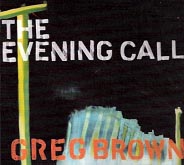If you’re unfamiliar with Greg Brown, here’s a brief bio: he’s a veteran on the folk singer/songwriter scene, with 25 other releases under his belt, dating back to 1974.
He’s a Midwestern boy, a perspective that comes through in his songwriting. Greg Brown seems to be all about fishing, farming, and looking back to a less complicated, less materialistic America; and he’s a hopeful-romantic to boot. He is a deep thinker, a creative song writer, and an emotive musician. Considering all this, Mr. Brown has set the bar fairly high for his newest release, and (sorry to spoil the ending) he bumps it up a notch with The Evening Call.
This folk album leans heavily on the blues, but Greg Brown’s honest, balanced and complicated worldview sets it well apart from your standard Chicago-blues fare. Most of this album is wanton and depressed, but there is a current of joy and tenderness throughout (mixed with judicious humor) that keeps it from wallowing. It revels in the depravity of its own creation. The sorrow and melancholy found in “Pound it on Down” and “Cold+Dark+Wet” are well balanced by the simple satisfaction of “Mighty Sweet Watermelon” and playful lyricism in “Bucket.” Brown does a great job keeping this album fresh, away from cliché, but still manages to fill it with nuggets of truth like “Try me on the cell, but most places I want to be it doesn’t work,” and beautiful images like “she put her ring in her underwear drawer / while the world tumbled from war to war.”
This album keeps coming back to questions about just what the hell is going on in this country. The Evening Call isn’t a political album by any means—but it is thoughtful. In his ponderous and bluesy style, Brown repeatedly asks questions like, “Tell me what is a fella supposed to do / when a car costs what a house used to / and a house is a pile of chipboard, paint and debt?”
In a similar vein, the track “Kokomo” paints a Midwestern picture of depression, population: hookers with “nipples the size of jack balls,” dilapidated grain-silos and “tenderloin specials at the Sak ‘n’ Save.” Weird. He beseeches all young cowboys to get into software, wondering “Why be a roustabout now, when you could be a millionaire?”
This depravity is fully integrated with a strangely romantic perspective. The title track features amazingly lyrical lines and this haunting verse:
She has grown cold, but how warm she was—
The morning lawn writes history
In lost high heels and empty cups
Whose lipstick stains are kissing me.
Brown tosses these little jewels indiscriminately throughout the album, and delivers them with either a tongue-in-cheek or a knowing half-grin. Not all of the writing stands up to these gemstones, and Brown seems to know it. This lends an uneven feeling to the album, which is somewhat distracting. I like to think that it’s crafted like the scalloped edge of a faux-antique roll-top desk.
The Evening Call is paced a like bit like that antique forgery, too. Brown takes his time with this album, with only two of the twelve tracks finishing under four minutes, with nary an up-beat, old-school rock n’ roll power-ballad to be heard. The slow tempo resonates with the ideas expressed in the songs themselves. It hearkens back to an America that took time to send love letters through the US Postal Service, rather than e-cards from Hallmark-dot-com.
This album represents nothing new (in terms of style or delivery) for Greg Brown. It seems an awful lot like his last album, and some songs could be confused with a track or two from the one before that. His strength and his weakness both lie in his great songwriting talent and his somewhat quirky style, which he settled into long ago and never deigned to change. Some veteran folk singers reinvent themselves by bringing new musical elements into their repertoire—Bob Dylan went electric fairly early in his career; and Neil Young integrated elements from folk, blues, rock n’ roll, and jazz; while Greg Brown and his acoustic guitar have by-and-large stuck to their shtick.
Still, if you set this group of songs beside 44 & 66, Greg Brown’s ’92 release, you’ll see that he’s grown by leaps and bounds—technically, lyrically, intellectually, and emotionally. He’s the same guy doing mostly the same stuff, only he’s much better at it.
I’ll try and sum it all up in as few words as possible:
Melancholy. Humor. Joy. Thoughtful. Romantic. Folky. True. Familiar. Good. Four-point-two stars of five.






